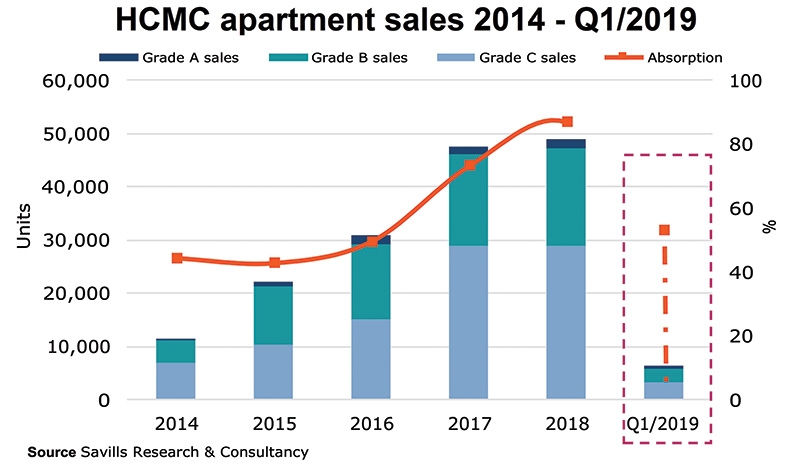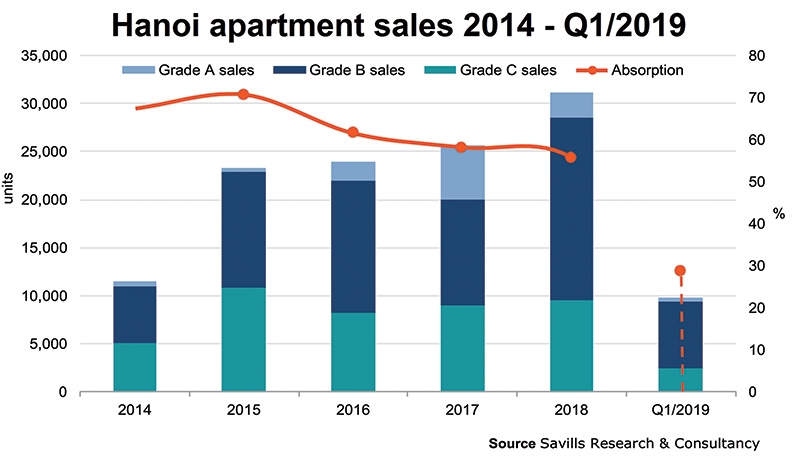Impacts certain from new draft regulation
 |
| Do Thi Thu Hang |
The VND3 billion threshold put the majority of residential products under its influence. At current pricing, there is hardly any of these products below that cost, with the exception of projects in suburban areas where the demand is limited.
Meanwhile, typical prices for Grade B and Grade A condominiums in Hanoi and Ho Chi Minh City start from VND3 billion. According to Savills Research & Consultancy, these two segments account for a large share of apartment sales in the two cities. Grade B condos have always taken up over 50 per cent of the existing total stock in Hanoi. Although Grade B stock is also significant in Ho Chi Minh City, there are more condos under VND3 billion in the southern city than the capital, due to a larger Grade C share.
As such, the extent to which the market is affected by increasing lending risks is different between two cities. Ho Chi Minh City has more premium products than Hanoi, and the increase of lending risks is taking its toll the in Grade A apartments in Ho Chi Minh City.
In other markets out with these two cities, the resort segment is on the list for adjustment. Standard products under VND3 billion are recommended as a trendsetter for better market control.
However, it should be noticed that once this draft is approved, it will affect the overall market.
An advantage of tightening real estate loans is the decreased dependence of borrowers on the loans as well as on banks. However, individual buyers will face difficulties in accessing capital for housing products.
Normally, individual buyers tend to have two main capital-raising channels when it comes to home loans: from family and banks, which offered defined conveniences and benefits. Today, there are more capital-raising channels of choice for individual buyers; however, they are not available all the time, and thus the tightening on real estate loans will affect the market growth.
 |
 |
For developers, it will surely affect the return on investment time as lending restrictions might cause the demand to fall as buyers endure difficulties in accessing loans. This, in turn, lengthens their return on the investment period.
Under these circumstances, developers will take a number of measures such as restricting the development size or offering incentives for purchasers, perhaps in the form of more flexible payment progress. In some ways, this will result in lower-than-expected revenue, hence diminished supply for the market. With the realisation of the proposed regulation, market performance is expected to reduce.
By Do Thi Thu Hang Director, Research & Consultancy Savills Hanoi
What the stars mean:
★ Poor ★ ★ Promising ★★★ Good ★★★★ Very good ★★★★★ Exceptional
Related Contents
Latest News
More News
- An Phat 5 Industrial Park targets ESG-driven investors in Hai Phong (January 26, 2026 | 08:30)
- Decree opens incentives for green urban development (January 24, 2026 | 11:18)
- Public investment is reshaping real estate’s role in Vietnam (January 21, 2026 | 10:04)
- Ho Chi Minh City seeks investor to revive Binh Quoi–Thanh Da project (January 19, 2026 | 11:58)
- Sun Group launches construction of Rach Chiec sports complex (January 16, 2026 | 16:17)
- CEO Group breaks ground on first industrial park in Haiphong Free Trade Zone (January 15, 2026 | 15:47)
- BRIGHTPARK Entertainment Complex opens in Ninh Binh (January 12, 2026 | 14:27)
- Ho Chi Minh City's industrial parks top $5.3 billion investment in 2025 (January 06, 2026 | 08:38)
- Why Vietnam must build a global strategy for its construction industry (December 31, 2025 | 18:57)
- Housing operations must be effective (December 29, 2025 | 10:00)

 Tag:
Tag:



















 Mobile Version
Mobile Version